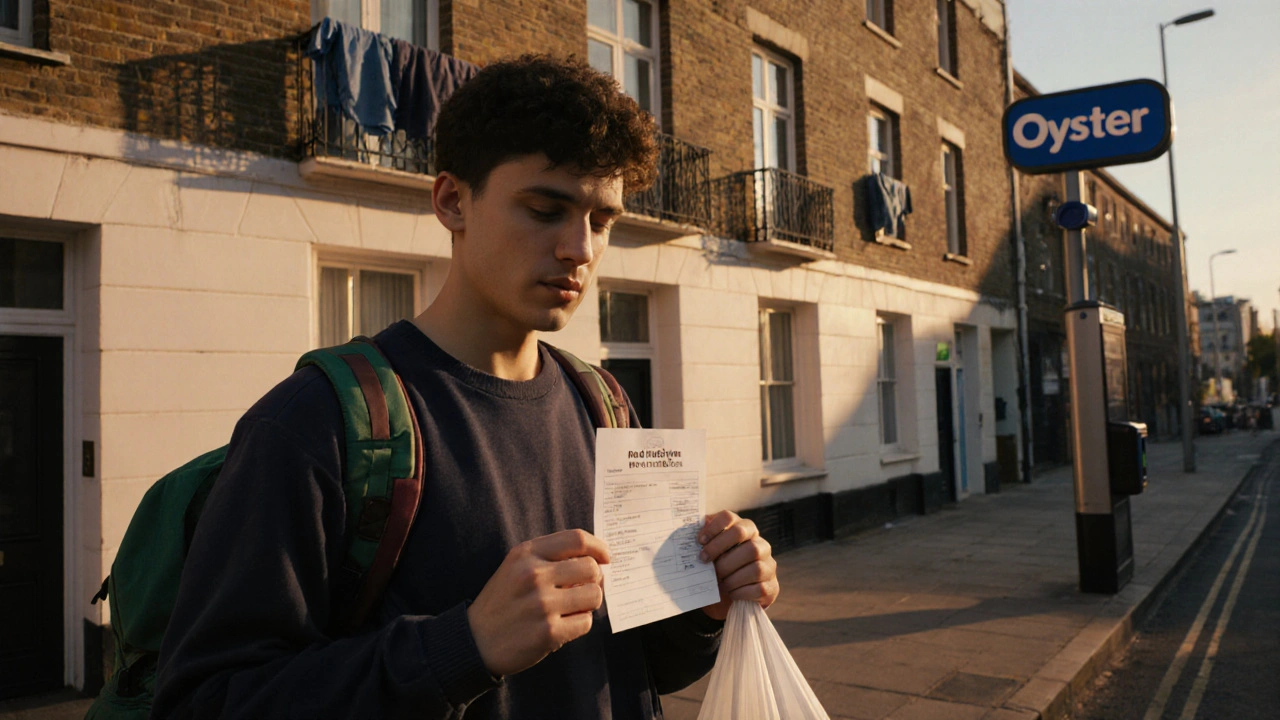Living in London as a student isn’t cheap-but it doesn’t have to break you. If you’re planning to study in the city, you need to know what you’re really paying for. Not the brochures. Not the university estimates. The real numbers. The ones that show up on your bank statement every month.
Rent: The Big One
Rent is where most student budgets go to die. In 2025, a single room in a shared flat in Zone 2 or 3 (like Brixton, Peckham, or Croydon) costs between £850 and £1,100 a month. If you want to live closer to central universities like UCL or King’s, expect £1,200 to £1,600. That’s not a typo. That’s London.
Students who try to cut corners by living in Zone 4 or 5 often end up spending more on transport than they save on rent. A 45-minute commute each way adds up-especially when you’re tired after lectures. The sweet spot? Zone 2. It’s not cheap, but you’re under 30 minutes from most campuses, and you can walk to a decent supermarket or pub after class.
Most student housing contracts run for 44 weeks, covering the academic year. That means you don’t pay rent in July and August. But here’s the catch: many landlords still ask for 12 monthly payments upfront. Make sure you know if your rent includes bills. Some places do. Most don’t. If it doesn’t, add £80-£120 for utilities, internet, and council tax (students are exempt, but you still need to apply for the discount).
Food: Eat Smart, Not Cheap
£150 a month is the bare minimum to survive on food in London. But that means eating beans on toast every other day. If you want to eat properly-real meals, veggies, protein-you’ll need £200-£250.
Supermarkets are your best friend. Lidl and Aldi are cheaper than Tesco or Sainsbury’s, and they’ve gotten way better in the last few years. Buy in bulk. Cook once, eat twice. A big pot of pasta or lentil stew lasts three meals. Frozen vegetables are just as nutritious and cheaper than fresh.
Student discounts help. Many campus cafés offer £3 lunches. If you’re near a university, check out the student union’s weekly meal deals. Some places like Pret or Greggs have student loyalty cards that give you 20% off. Don’t ignore them. A £1.50 coffee every day adds up to £45 a month. Brew your own. Even if it’s just a kettle and a mug.
And yes, take advantage of the student discount on groceries. Many chains offer 10% off with a valid NUS card or UNiDAYS. That’s £20-£30 saved per shop.
Transport: The Oyster Trap
London’s transport system is efficient-but expensive. A single tube ride during peak hours costs £3.20. If you commute daily, that’s £16 a day. That’s £80 a week. £320 a month. No student should pay that.
The answer? A 16-25 Railcard. It costs £30 a year and gives you 1/3 off all rail and tube fares. That’s a £100+ monthly saving if you’re commuting regularly. You can get it online in minutes. Use it with your Oyster card or contactless payment.
Students under 18 get free travel on buses and trams. If you’re 18-25, get the 16-25 Railcard and use contactless. Pay daily, and it caps at £8.50 for unlimited travel in Zones 1-2. That’s cheaper than a monthly pass if you don’t travel every single day.
Don’t buy a monthly Travelcard unless you’re commuting 5 days a week, 4 weeks straight. Most students don’t. Pay-as-you-go with contactless + Railcard is smarter. And if you’re studying in South London, buses are often faster than the tube. They’re also cheaper-£1.75 per ride with a cap of £5.50 a day.

Putting It All Together: A Realistic Monthly Budget
Here’s what a typical student spends in London in 2025:
- Rent: £950
- Food: £220
- Transport: £70 (with Railcard and contactless cap)
- Utilities (if not included): £100
- Phone bill: £15
- Books and supplies: £25
- Random stuff (laundry, toiletries, coffee out): £80
Total: £1,460
That’s the baseline. If you live in Zone 1 or want a private studio, add £300-£500. If you eat out twice a week, add another £100. If you don’t use the Railcard? Add £150.
Most students get a maintenance loan. For 2025-26, it’s up to £10,900 for students living in London. That’s £908 a month. That’s not enough. Not even close. So you need to plan for the gap.
How to Cover the Gap
Most students work. Part-time jobs on campus pay £12-£14 an hour. That’s 10-15 hours a week to cover the shortfall. You can do it. Many do. Tutoring, bar work, or campus ambassador roles are common. Some students pick up freelance gigs-editing, design, transcription-on platforms like Fiverr or Upwork.
Don’t rely on your parents. Many can’t afford it. And if they can, it’s still better to learn how to manage your own money. Start tracking your spending. Use free apps like Moneyhub or Monzo. They show you where your money goes. You’ll be shocked.
And yes, there are hardship funds. Every university has one. If you’re running out of money, apply. You don’t need to be in crisis. You just need to be honest. Most get £200-£500 a term. It’s not a handout. It’s a safety net.
What Not to Do
Don’t sign a lease without seeing the place. Photos lie. Walk in. Check the heating. Ask if the fridge works. See if the windows seal.
Don’t buy a monthly bus pass unless you’re using it every single day. Pay-as-you-go with contactless is smarter.
Don’t skip meals to save money. Your brain needs fuel. You’ll perform worse in exams.
Don’t use payday loans. They’re a trap. The interest is criminal. If you’re desperate, talk to your student union. They have free financial advice.
Final Tip: Start Early
If you’re moving to London in September, start budgeting in June. Open a separate bank account for rent and bills. Set up automatic transfers. Save £100 a month before you even arrive. That’s £600 before term starts. It gives you breathing room when your first rent payment hits.
London is expensive. But it’s also full of opportunities-free museums, student events, cheap cinema nights, university sports clubs. You don’t need to spend a lot to live well here. You just need to know where your money goes.
Is £1,500 enough to live as a student in London?
£1,500 is the minimum for a basic lifestyle in London if you live in Zone 2-3, cook most meals, use a 16-25 Railcard, and avoid unnecessary spending. Most students need to supplement this with part-time work. The maintenance loan covers around £900/month, so you’ll need to earn or save the rest.
Can I save money by living outside London?
You might save £200-£400 on rent by living in Essex, Kent, or Surrey. But your monthly transport costs could jump to £180-£250. That eats up most of the savings. Plus, you lose access to campus events, study groups, and spontaneous social life. For most students, the trade-off isn’t worth it.
Do students get free transport in London?
Only if you’re under 18. Students aged 18-25 don’t get free travel, but they can get a 16-25 Railcard for £30/year, which cuts tube and rail fares by a third. Combine it with contactless payment and daily caps to keep costs low.
What’s the cheapest way to eat in London as a student?
Cook at home using Lidl or Aldi. Buy in bulk. Use student discounts on groceries with UNiDAYS or NUS. Take advantage of campus meal deals (often £3-£4 for a hot lunch). Avoid eating out unless it’s a special occasion. Frozen meals and batch cooking are your allies.
Are student housing contracts always 44 weeks?
Most university-managed housing contracts are 44 weeks, covering the academic year. Private landlords may offer 52-week contracts. Always check. If you’re paying for 52 weeks but only staying 44, you’re overpaying. Negotiate or find a place with a 44-week contract.
How much should I save before moving to London?
Aim for at least £1,000 before you move. That covers your first month’s rent, deposit, and essentials like bedding, kitchenware, and a SIM card. Many students get hit with unexpected costs in the first week-like a broken fridge or a lost Oyster card. Having a buffer avoids panic.
If you’re heading to London for uni, you’re not alone. Thousands of students manage this every year. It’s tough, but doable. The key isn’t having more money-it’s knowing where to spend it, and where to cut back. Start now. Track it. Plan it. And don’t let rent decide your social life.
